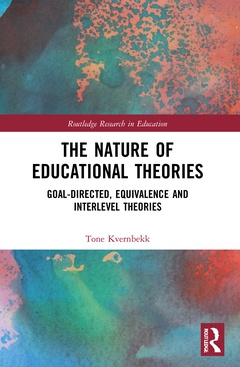Description
The Nature of Educational Theories
Goal-Directed, Equivalence and Interlevel Theories
Routledge Research in Education Series
Author: Kvernbekk Tone
Language: English
Subject for The Nature of Educational Theories:
Keywords
Driver’s Theory; Education theory; Correspondence Rules; theorists; Theory Practice Relation; practice; Educational Theories; structure; Van Fraassen; metatheory; Teleological Entity; theory matter; Hirst’s View; philosophy of education; Good Life; Education policy; Patrick Suppes; Educational phenomena; Theoretical Postulates; Bas Van Fraassen; Agnostic; Theory Practice Relationship; Content Specific Beliefs; Auxiliary Hypotheses; Frederick Suppe; Foundational Disciplines; Causal Sufficiency; Theoretical Law; Student Parameters; Means End Reasoning; Theory Application; Meta-theoretical Approach; Middle Range Theories; SC
Approximative price 46.39 €
In Print (Delivery period: 14 days).
Add to cartPublication date: 01-2023
· 15.6x23.4 cm · Paperback
Publication date: 06-2021
· 15.6x23.4 cm · Hardback
Description
/li>Contents
/li>Readership
/li>Biography
/li>
This important book offers a meta-theoretical account of educational theories and how they work. It offers a classification scheme of distinct types of educational theory in which the account developed can inform the work of educational theorists and practitioners.
Kvernbekk observes throughout how meta-theoretical knowledge of the structure of theory types will improve the understanding and representation of educational phenomena and enhance theorists? and practitioners? ability to change those phenomena for the better. She explains how philosophical accounts of scientific theories can help us understand the nature of educational theories by applying two influential but different theory conceptions ? the Received View and the Semantic Conception ? to the field of education. Kvernbekk argues that educational theories, like other scientific theories, are representational devices that allow us to understand, describe and explain phenomena, and, when desired, to change them. The classification scheme offered allows us to discriminate distinct types of educational theory: goal-directed, equivalence and interlevel theories. Examples of all three types are discussed, explaining their structure, what they sayabout the phenomena and howthey say it. The book also offers a critical overview of different conceptions of practice and different understandings of the theory?practice relationship.
Encouraging a strong understanding of what theories say about the phenomena they represent, this book will be of interest to educational researchers and postgraduate students in the fields of philosophy of education, education theory and education policy, and to philosophers of science and philosophers working on ?practical? philosophical issues.
1. Introduction. 2. Education – Field and Theory. 3. What Theories Are. 4. Goal-Directed Theories. 5. Equivalence Theories. 6. Interlevel Theories. 7. What Makes an Educational Theory Good? 8. Conceptions of Practice. 9. Theory and Practice. 10. Theory Applications and Other Uses. 11. Conclusion.
Tone Kvernbekk is Professor of philosophy of education in the Department of Education at the University of Oslo, Norway. She mainly publishes on philosophical and epistemological issues as they bear on problems in educational theorizing. She also publishes in argumentation theory and narrative theory and likes to combine perspectives and draw on multiple sources.




